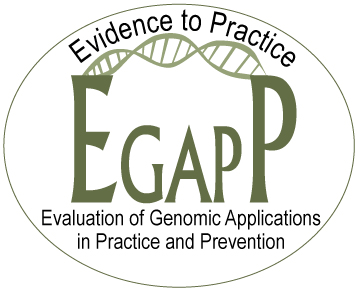Search Results
10 results for cancer
Why We Can’t Wait: A Public Health Approach to Health Disparities in Genomic Medicine

In May 2013, I attended and presented at the “Why We Can’t Wait Conference to Eliminate Health Disparities in Genomic Medicine.” The conference was organized by the University of Miami and Stanford University, with attendees and speakers from academia, consumer organizations, government agencies, public health, clinical practice, and the private sector. A key rationale for
Posted on byA Public Health Genomic State-by-State Clickable Map: Accelerating Implementation of Genomics Applications to Improve Population Health

In recent years, public health programs in several states have used innovative approaches to implement evidence-based genomic testing recommendations in an effort to improve health outcomes for people at increased hereditary risk for breast, ovarian, colorectal and other cancers. For example, the Michigan Department of Community Health [PDF 1.04 MB] has partnered with payers in
Posted on by 1 CommentNew Products from the EGAPP Working Group: Further Development of Evidence Review Methodology and More Recommendations in Genomic Medicine

The independent EGAPP working group (EWG) held its 27th meeting on May 13-14, 2013 via a virtual online venue. The EWG has been very active since the last meeting. Highlights included: The EWG has four new publications since the last meeting: Recommendations from the EGAPP Working Group: does genomic profiling to assess type 2 diabetes
Posted on byWalking Before Running: Genomic Medicine 10 Years After the Human Genome Project

It has been said that the folks at the National Human Genome Research Institute (NHGRI) never pass up the chance for well-deserved celebration – and I should know, I was one of them. Probably at least a few readers have noticed that the Human Genome Project (HGP) has celebrated a number of milestones and anniversaries over
Posted on by 1 CommentOn Spinning Wheels and Genomes Revealed:

Sequencing is No Longer a Sleeping Controversy In the classic Disney version of the fairy tale, Sleeping Beauty is hidden in the woods to protect her from the knowledge of an evil curse… but when she later pricks her finger on a spinning wheel, she falls under a fairy’s spell… Unlike the mythical magic of
Posted on byImplementing Evidence-based Genomics Recommendations at the Intersection of Public Health and Healthcare

We take the opportunity of March 22, 2013, designated as Lynch Syndrome Awareness Day by 13 U.S. state governors and counting, to highlight state public health genomics programs that are taking innovative approaches to implement evidence-based genomic testing recommendations for hereditary cancer syndromes, including Lynch syndrome.
Posted on byAccelerating the Development of Evidence Reviews and Recommendations in Genomic Medicine

The independent EGAPP working group (EWG) held its 26th meeting on February 11-12, 2013 at the CDC campus in Atlanta. Highlights included: Three EWG recommendation statements on the validity and utility of genetic tests are pending publication on: KRAS, BRAF and other markers involved in EGFR signaling, which are used to inform choice of therapies for
Posted on byHow Can We Use Genetic Testing in Population Screening for Common Diseases?

Scientific and implementation challenges Population screening for disease is a concept that has been around for many decades. Its main purpose is early detection and treatment of asymptomatic disease, or risk assessment and prevention of future disease, in order to improve health outcomes in individuals and populations. Examples include mammography in breast cancer screening and
Posted on by 1 CommentPublic Health Genomics: 15 Years On

In 2012, the United States and the United Kingdom marked 15 years of public health genomics, a multidisciplinary field that deals with the effective and responsible translation of genome-based science to improve population health. Fifteen years ago, a new era of personalized healthcare and disease prevention seemed only around the corner. However, the promise of
Posted on byFrom Genetic Counseling in Individuals to Cascade Screening in Populations: An Emerging Role for Public Health Practice

There are more than 2500 diseases for which genetic testing is currently available. Most of these diseases are individually rare conditions but collectively affect millions of individuals and families worldwide. Genetic diseases are usually caused by mutations in one or a few genes that may confer a high risk of illness, disability and early death.
Posted on by 1 Comment